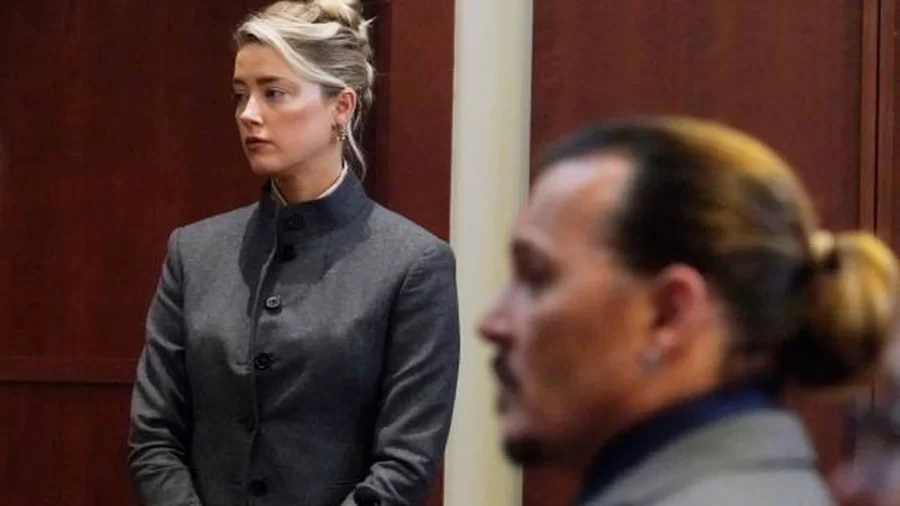Depp v. Heard goes beyond the courtroom
In many ways, the defamation case represents a culture shift
June 25, 2022
Content warning: This article contains language and discussion of interpersonal violence that some readers may find upsetting. If you or someone you know has been sexually assaulted, help and support can be found at online.rainn.org or by calling 806-656-HOPE.
On June 1, the nation’s eyes rested upon a courtroom in Fairfax County, VA, where the John C. Depp, II v. Amber Laura Heard defamation lawsuit had come to a long-awaited end. The case, which had been underway since April, straddled the line between a legitimate legal dispute and what many in the public perceived as a captivating television drama unfolding in real-time.
While it is unlikely that Depp or Heard spent hours scrolling through the thousands of posts dismissing their abuse and laughing at their lowest moments, other victims of domestic violence did. As Depp fans jeered at Heard for voicing the abuse she had suffered at the hands of her ex-partner, the world watched as the compassion and empathy women have worked tirelessly to construct for victims crumbled before their eyes.
When the jury announced that Depp had been awarded $15 million in damages against Heard, the uproar from those celebrating this victory for the famed actor and former heartthrob drowned out the rings of concern from those less enthralled by the spectacle of the case. As fans took to social media lauding Depp’s victory and taunting ‘crazy’ Heard, the alarm bells signaling a shift in the #MeToo era could be heard far and wide by those who had watched this familiar scene play out time and time again.
The jury deemed Heard responsible for three counts of defamation against Depp, derived from a Washington Post op-ed written in 2018 in which Heard identified herself as a survivor of domestic abuse. Despite the evident ambiguity that Heard’s essay presented — she did not identify Depp as her abuser — the Depp v. Heard verdict represented a crushing blow to the millions of domestic violence and sexual assault survivors that have found power and solidarity online since the rise of the #MeToo movement in 2016.
The outcome of this case has garnered criticism from those well-versed in the law, who dispute the notion that a victim’s declaration of abuse from an anonymous party should constitute defamation. Furthermore, the very public nature of this lawsuit and the decision reached by the jury jeopardizes survivors’ freedom to communicate their suffering without fear of retribution from an unnamed abuser.
While survivors have consistently been forced to sacrifice their personal and emotional wellbeing in the pursuit of justice, the slew of hate directed at Heard from every angle of the American public demonstrated an unprecedented victory by Depp’s public relations team. Depp dismantled and destroyed Heard’s credibility, casting her as an unstable, jealous and erratic ex-wife, all while sweeping over the legitimate threats he had heaved at Heard during their tumultuous relationship. One text sent by Depp read “let’s burn Amber,” followed later that day with “let’s drown her before we burn her!!! I will [expletive] her burnt corpse afterwards to make sure she is dead.”
Despite Depp’s clear display of malice and reference to appalling acts of violence, Heard was continually ridiculed for her allegations of abuse across the Internet and social media platforms alike. Social media platforms such as TikTok and Twitter acted as catalysts for this harassment, with users posting content in support of Depp that mocked Heard’s reported abuse.
In the midst of this widespread disregard for Heard’s testimony, many have begun to question the limitations of the post #MeToo world that was created from an outpouring of support for survivors. Where the consensus established throughout the movement has centered around believing victims first and foremost, the asymmetrical treatment shown towards Depp as opposed to Heard has underscored the deeply ingrained societal misogyny that colors every discussion of abuse.
This lawsuit resulted in a verdict favoring Depp. However, the testimony offered by both Heard and Depp painted an image of a deeply troubled and abusive relationship. Unfortunately, these two public figures who had spent months fighting a vicious battle destroyed more than their own solace. As Depp and Heard took turns jeering at the other’s failures and belittling the suffering they incurred, a far less visible loser emerged from this case: survivors.
While it is unlikely that Depp or Heard spent hours scrolling through the thousands of posts dismissing their abuse and laughing at their lowest moments, other victims of domestic violence did. As Depp fans jeered at Heard for voicing the abuse she had suffered at the hands of her ex-partner, the world watched as the compassion and empathy women have worked tirelessly to construct for victims crumbled before their eyes.























